#eurovision 1980
Text
Happy birthday to the following: Alexander Rybak (Norway, 2009 & 2018); and Johnny Logan (Ireland, 1980 & 1987).
May your respective voices continue to resonate with the world and your birthdays be filled with love and joy. 🎉🥳🎂
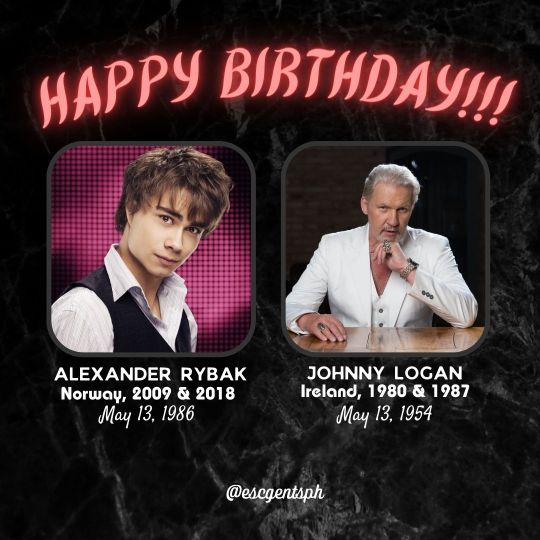
#alexander rybak#johnny logan#eurovision#eurovision song contest#guys of eurovision#men of eurovision#esc#eurovisonfan#eurovision boys#esc 2024#i love eurovision#eurovision 2024#eurovision 2009#eurovision 1980#esc 2018#esc 1987#happy birthday#birthday
9 notes
·
View notes
Text
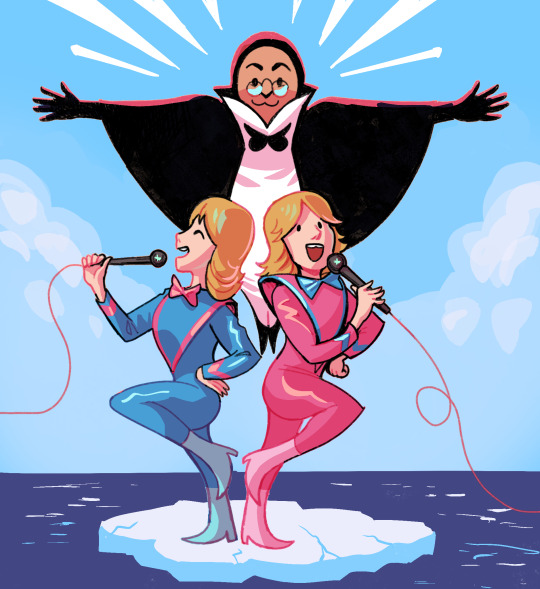
🇱🇺 Papa Pingouin - Sophie & Magaly
#Papa Pingouin#Sophie & Magaly#esc luxembourg#luxembourg esc#eurovision luxembourg#luxembourg eurovision#esc 1980#eurovision 1980#esc#eurovision#The second twins at eurovision after alice and ellen kessler (germany 1959) i think#neither of them is among us anymore... :(#at least we have this classic song to remember them#also can we talk about the costumes this year? we've JUST entered the 80s and everyone is going crazy on those 80s colours
54 notes
·
View notes
Text
The Hague 1980
Host: Netherlands
Participants: 19
Voting method: 12-point system (juries only)
Winner: Johnny Logan - What's Another Year
Country: Ireland
Points: 143 (66.2% of highest score possible)
Language: English
General Overview:
1980 feels like a reboot year. It's the landmark 25th edition, but it doesn't feel like it. Mainly because no one wanted to host the thing. Israel could not afford it again - actually, they withdrew entirely because of a national holiday. Meaning that this is the only contest where the reigning champ is absent. The 1979 runner-up Spain also declined to host. As did the UK, who were always the reliable back-up plan. So in the end, the Netherlands accepted the job with a low budget.
And I can tell the Dutch broadcaster put minimal effort into this. They reused the same venue as 1976. The stage looks similar - it's a wide platform with moving floating shapes in the background (which resembles a grey mask with red eyes; or an alien face). The opening sequence is the usual local footage, leading to the orchestra playing for a bit. The presenter, Marlous Fluitsma, speaks to the audience exclusively in Dutch. And there's no postcards – instead, a representative from each country goes on stage to introduce their song. On the bright side, 1981 will begin a 41-year streak of the most recent winning country hosting the next one.
Having said that, I like that the interval act showcases Caribbean culture. It involves some upbeat music and dancers on stage. I don't like that they kept interrupting their performance to cut to the Green Room though.
The vote reveal is amusing, where Marlous pulls out a different phone to call each country. 1980 is also the year when the spokespersons began reading their points in ascending order instead of running order. Which adds more suspense and less confusion. Too many countries were submitting incorrect votes.
Turkey returns and Israel's absence allows Morocco to debut. Meanwhile, Monaco says goodbye for 25 years.
Despite the low budget, 1980 is a strong year. It has some bops! There's also a lot of campy entries and gimmicky staging; probably because of “Dschinghis Khan”.
Austria: Blue Danube - Du bist Musik
A forgettable start to a new decade. The only interesting aspect is the Space Age synth, which sounds like my friend's phone alarm. The composition is just too mild. The verses are bland. The bells are so subtle. The “DU BIST MUSIK!” chorus ending (with the horns) is meh. And the lyrics are whatever – they compare the subject to a lengthy list of composers and music terms; conclusively declaring “you are music!”. The song does work as an opener though – it's light and carefree, with a 'good morning' vibe. And the drum/string intro and the “harmony, melody...” part are okay.
Turkey: Ajda Pekkan - Pet'r Oil
The juries underrated Turkey back then. The intro establishes a traditional sound with the hand drums and strings. The “a-MAN... PET'R OIL” hooks, along with the intensifying bit afterwards, is so catchy. And the “WHOOOA” dives, vocal chants, finger bells, and hand claps are positives too. The orchestra could be more powerful, but it's still good. The lyrics are (supposedly), literally about petrol. It's a commentary on humanity's overdependence on oil and the role money plays. Basically, oil makes life more convenient by powering our modern technology. I assume this was a response to the 1970s oil crisis and recession.
Greece: Anna Vissi and the Epikouri - Autostop
An undeniably catchy “circus music” entry with a slick performance. I like the way they move around, while Anna points a lot. The dramatic slowdowns are super effective too. But she says “Autostop” too many times and it gets annoying after a while. Otherwise, the intro is like a blustering wind. The drums stomp around in the verses. There's some xylophone and backing ad libs. And the chorus has a marching band rhythm - it also pauses for a farting horn. The lyrics are about hitch-hiking to explore the world.
Luxembourg: Sophie & Magaly - Papa pingouin
An iconic, delightfully camp, and ridiculously catchy nursery rhyme that features a man in a penguin costume. He waddles, trips, mutters, makes funny faces, gets spanked, and tries to fly lol. The backing singers also wear penguin tuxedos. And the lyrics are comical, where this grumpy penguin wishes he could fly, until he's compassionately convinced to love his life the way it is. The orchestra moves smoothly and calmly. The chorus is well-constructed, with the “LE PAPA PINGOUIN...” repetitions, the accompanying xylophone clacks, and how the strings slide in afterwards. The call-and-response sections and the “papapa..” escalations are also great.
Morocco: Samira Bensaïd - Bitaqat Hub
Morocco's only participation flopped. Maybe the song was too foreign for the juries. It doesn't have the catchiest chorus either. But it's a lovely song with a smooth texture and a great message. The strings, hand drums, and Samira's robe establish a cultural vibe. Those strings are incredible too – especially the twirling intro (with the dings), and how they overpower and tiptoe in the first verse. The “oh oh oh” and “la la la” ending is nice too. The lyrics ask for peace and to end racism. Samira says we want unity, safety, justice, prosperity, loyalty, and happiness; free from greed and rival neighbours.
Italy: Alan Sorrenti - Non so che darei
Why was this 6th? It's a light and relaxed soft rock song, but in a very bland and boring way. Alan's falsetto in the chorus is unbearable. The leaning and swaying from the backing members is giving stoner energy, although the pink and purple clothing is visually appealing. And the instrumental and lyrics are unremarkable. Alan just wants one more night with his ex. He doesn't hide it or know why.
Denmark: Bamses Venner - Tænker altid på dig
This is kinda boring – it's a very laid back and minimalist song. But it's also sweet and comforting, the melody is nice, and I don't mind Bamses's raspy vocals. The percussion kicks drive the verses, alongside some violins and subtle tambourine. While chorus speeds up somewhat. I like the little horn hops during it. On stage, everyone wears blue or red overalls and striped shirts. The backing looks unhappy though. In the lyrics, Bamses has to leave for a while (for work?) The subject dreams of things being normal again. But he's always thinking of them.
Sweden: Tomas Ledin - Just nu!
Rock entries were uncommon back then. Tomas flaunts his high assertiveness on stage; including some “manspreading”. But oops at him disconnecting the microphone wire. The “Just nu!” shouts are super catchy, albeit repetitive. The recurring clawing piano riff, the tense strings, the stretchy guitar responses, and the softer post-chorus (with the flutes) are all highlights. But the song fizzles out towards the end. The bridge is the same as the post-chorus, but with more “JUST NU!”s. The lyrics are about needing to escape the mundane city life. The chorus exclamations are when he's had enough.
Switzerland: Paola - Cinéma
No more weirdness from Switzerland for a while. Instead, Paolo praises the magical world of cinema! She explains how movies define our childhood. She also lists several Disney characters and old school actors. The song itself switches styles several times – from a classic, gentle, pretty ballad to big band brass to an energy-releasing chorus to a tap dance break. And finally, a tuba outro lol. The “cinéma, cinéma” hook is alright. And Paola's vocals and stage presence are highlights.
Finland: Vesa-Matti Loiri - Huilumies
Vesa's voice is so irritating. Finnish has those unfortunate “oi oi oi” sounds. The lyrics explain how his flute expresses the wide range of everything he feels. He even plays a flute solo 3 times. He also scats during the bridge. Otherwise, the intro sounds like a sitcom theme. The backing vocals emphasize certain parts. And the chorus does this thing where it speeds up midway, then stops, intensifies, and normalizes.
Norway: Sverre Kjelsberg & Mattis Hætta - Sámiid ædnana
An interesting concept that lacks cohesion. After the Christmassy intro, the first minute involves a bunch of random tempo changes, as Sverre plays the guitar in Luke Skywalker clothing. Then Mattis walks out, and it becomes a completely different song, where he repeats the same “yoik” endlessly. I prefer the latter 2/3 though. It begins a cappella, then adds one instrument at a time (and Sverre singing separately) to build intensity; until the ending quiets again. It symbolizes a distant chant growing stronger. The lyrics support the then-recent protests against building a hydroelectric dam on Sami land.
Germany: Katja Ebstein - Theater
The only artist with 3 top 3s. Unless you count the writing credits of the man that beat her. This one is pretty camp. The mimes are very distracting, but they make the staging memorable. I like when they waltz side-to-side with Katja. Their background muttering enhances things too. The lyrics are about the facade that stage performers must put on, even if they're sad or scared on the inside. There's a theater piano intro, then the song starts as a ballad. The circus-y beat takes over soon enough though. There's also a teeth-chattering piano and some piano slides. And the “THEATER, THEATER” hooks are catchy.
United Kingdom: Prima Donna - Love Enough for Two
So. Much. Cringe. This is giving church summer camp vibes. It's sooo wholesome. I really dislike the performance – the three smiling couples, the peppy voices, the touching, the bright clothing, them standing together at the end. The chorus is catchy I guess, but not in an enjoyable way. The wedding bells and the key change are ugh. And the song title sounds like they want a threesome. I doubt that's what they meant, but it's a corny love song regardless. Otherwise, it's a summery easy listening song.
Portugal: José Cid - Um grande, grande amor
Portugal equals their best placement so far (7th). This is giving Elton John vibes. The first 15 seconds are a piano ballad. Then, after a few door knocks, the energetic orchestra takes over. The chorus melody feels big. The verse contains some dramatic bursts. The bridge rests for a soft backing refrain. And there's a false ending. José's performance is full of life, even though he just plays the piano and later stands up. In the song, he says goodbye to his lover in multiple languages. He sounds very happy about it. He calls it a “big love”, but he's a “free bird” now.
Netherlands: Maggie MacNeal - Amsterdam
This is nothing like “I See a Star”. The dark atmosphere is very compelling. The string intro establishes that mood. The verses sound sorrowful and pensive, while the chorus is ominously inviting thanks to the swinging bass stomps and panicked carousel sounds. That chorus creates an image of Maggie standing on a busy Amsterdam street at night, where she welcomes everyone. The “Amsterdam, Amsterdam” hooks are solid. And I like that descending light xylophone(?) scale that morphs into a piano. The oboe moment is nice too. The lyrics praise the city. Maggie makes it sound like a special, unforgettable place that has everything. It's where people feel freedom and belonging.
France: Profil - Hé, hé, m'sieurs dames
Basic and repetitive. The title phrase appears in every single stanza. It's a catchy hook, but it's too perky in the verses. The chorus, which feels more hectic, changes that hook to a joyous shout instead though. Otherwise, there's some “dodododo”s and background “ahhh”s. And the bouncing verse guitar is alright. But the song doesn't have much going on. The lyrics are about partying and having fun tonight. On stage, they open their arms, point, and sway side-to-side; while wearing rainbow glitter shirts not long after the pride flag was adopted.
Ireland: Johnny Logan - What's Another Year
(winner review below)
Spain: Trigo Limpio - Quédate esta noche
I love the dark atmosphere and how the song continually switches between lowkey and explosive. Even if they say “...a mí esta noche” a lot. The acoustic guitar intro establishes the mood. The orchestra sounds pretty at points. The first and last choruses grow midway, with a pounding drum initiating the switch. The second chorus leads to a trumpet moment instead, which allows the two verses to have different volumes as well. And the song ends on a galloping drum to intensify things further. In the lyrics, their lover is about to leave without an explanation – their suitcase is already packed. But the narrator offers affection and passion to persuade them to stay tonight.
Belgium: Telex - Euro-Vision
Belgium foreshadows the wacky 2000s. The chorus contains just one word (“Eu-RO-vis-ION”) said 6 times, with 4 synth notes repeating the same pattern. The main synth beat is quite static; until the ending slows down and turns squeaky. The lyrics get meta about the contest itself. The singer uses a talking voice. And his performance is eccentric – he pretends to smoke, plays with his scarf, makes goggle hands, twists his wrists, and pulls out glitter and a camera from his pockets. I just don't find this amusing.
The Winner:
Another decade begins with Ireland winning in the Netherlands, after some confusion over who would host it, while Katja Ebstein and the UK are in the top 3. This means Ireland achieves their second victory, as Johnny Logan starts his Eurovision dominance. He will contribute 4 songs over the next 12 years; all of which will reach top 2.
“What's Another Year” also sets the template for many upcoming Irish entries. Ireland's winning formula is a down-to-Earth artist singing about relatable common situations and emotions, usually as a ballad, in an honest way. Sure, they benefited from the language restriction rule back then, but they understood accessibility.
“What's Another Year” is a “mid” winner for me though. It sounds like a Christopher Cross song, who I find boring. It's early '80s yacht rock and easy listening. I prefer the bombastic “Hold Me Now”. Still, the saxophone makes this one stand out - it's my favourite part. I also like when the strings enter. And when Johnny raises his voice in the first chorus. But I'm disappointed he doesn't do it again. The second chorus, which is placed after the sax solo, is a fragile moment instead. And there's no final chorus – the outro just repeats the song title alongside a backing refrain. The backing voices are soft though.
Also, I can't decide if Johnny's performance is heartbreaking or sappy. He even sits on a stool to make it personal. In the lyrics, he's been waiting a long time for his ex to return. But his waiting seems futile. So he sighs “what's another year?”, as if 52 more weeks of misery won't bother him. He's lost everything, so what's the point of moving on. It comes across as self-pitying though.
Otherwise, Johnny jumping up and down when he won was cute. And this became a big chart hit in Europe.
Verdict: “C” tier.
My points go to....
01. Netherlands: Maggie MacNeal - Amsterdam
02. Morocco: Samira Bensaïd - Bitaqat Hub
03. Turkey: Ajda Pekkan - Pet'r Oil
04. Spain: Trigo Limpio - Quédate esta noche
05. Portugal: José Cid - Um grande, grande amor
06. Germany: Katja Ebstein - Theater
07. Luxembourg: Sophie & Magaly - Papa pingouin
08. Switzerland: Paola - Cinéma
09. Greece: Anna Vissi and the Epikouri - Autostop
10. Sweden: Tomas Ledin - Just nu!
11. Norway: Sverre Kjelsberg & Mattis Hætta - Sámiid ædnan
12. Ireland: Johnny Logan - What's Another Year
13. Denmark: Bamses Venner - Tænker altid på dig
14. Austria: Blue Danube - Du bist Musik
15. France: Profil - Hé, hé, m'sieurs dames
16. Belgium: Telex - Euro-Vision
17. Italy: Alan Sorrenti - Non so che darei
18. Finland: Vesa-Matti Loiri - Huilumies
19. United Kingdom: Prima Donna - Love Enough for Two
2 notes
·
View notes
Text
Maggie MacNeal representing the Netherlands in the Eurovision Song Contest Eurovisie Songfestival 1980, with the song Amsterdam

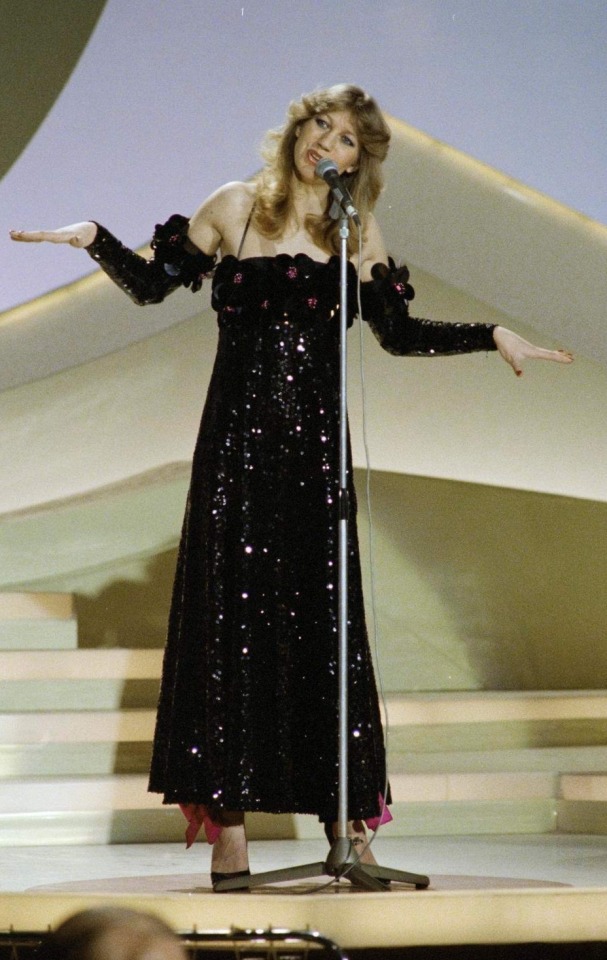
11 notes
·
View notes
Photo
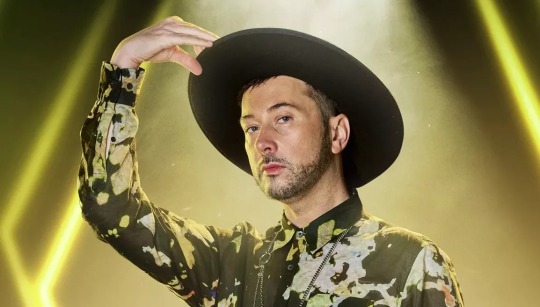
Gustaph (Stef Caers)
Gender: Male
Sexuality: Gay
DOB: 5 July 1980
Ethnicity: White - Belgian
Occupation: Singer, songwriter, music producer, vocal coach, teacher
Note: Represented Belgium in Eurovision 2023 and with Sennek in 2018 as a backing singer
#Gustaph#Stef Caers#lgbt#lgbtq#gay men#male#gay#1980#white#belgian#singer#songwriter#music producer#vocal coach#teacher#eurovision
80 notes
·
View notes
Photo
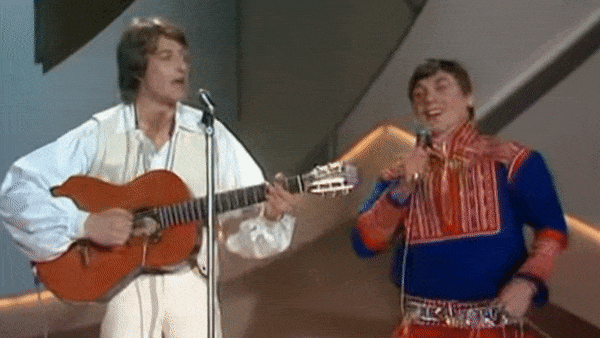
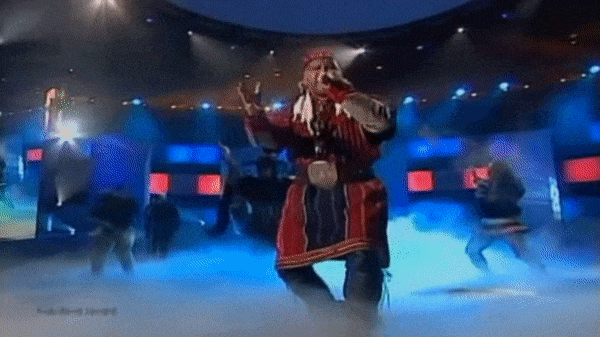
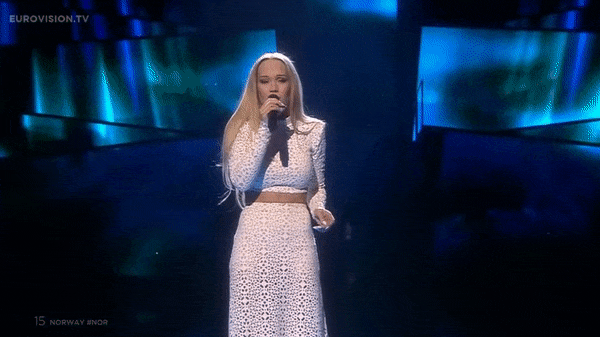
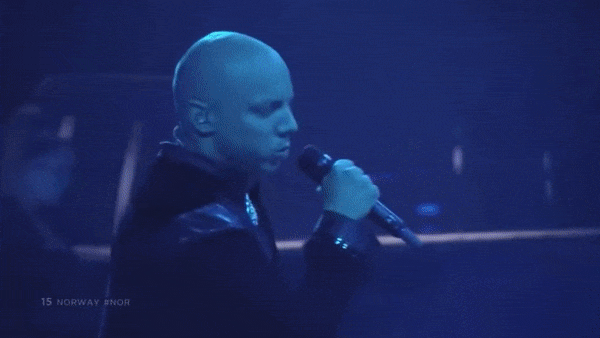
Sápmi in Eurovision
Norway 1980 Sverre Kjelsberg & Mattis Hætta - Sámiid ædnan
Sweden 2000 Roger Pontare - When Spirits Are Calling My Name
Norway 2016 Agnete - Icebreaker
Norway 2019 KEiiNO - Spirit in the Sky
#Lihkku Sámi Álbmotbeivviin!#Sámi National Day#yes I know Roger Pontare also represented Sweden in 1994 but that entry doesn't have Sámi influences like this one#if you're wondering why Agnete is here then she also competed in Sámi in MGP 2011#makes me ashamed that Finland has only had one Sámi entry EVER in our national selctions#shout outs to Solju (UMK 2015)#Elin & The Woods (MGP 2017 & 2020)#and Jon Henrik Fjällgren (Melodifestivalen 2015 & 2017 & 2019 & 2023)#manne leam joiker stikk manne leam frijje#sámi#eurovision#norway#sweden#1980#2000#2016#2019
102 notes
·
View notes
Text
Eurovision Fact #595:

Noel Kelehan, one of the conductors of the former Eurovision orchestra, conducted the songs of five winners. He conducted the winning songs in 1980, 1987, 1992, 1993 and 1996.
[Source]
Facts and Figures, Eurovision.tv.
#esc facts oc#eurovision#eurovision song contest#esc#eurovision facts oc#Noel Kelehan#esc 1980#esc 1987#esc 1992#esc 1993#esc 1996
9 notes
·
View notes
Note
ESC The Netherlands in 1980 or 1984?
As in which contest was better? 1980, hands down 👀
#I remember 84 being good but not AS good as 1980#80 was just a solid year tbh#Mod answers#Eurovision
4 notes
·
View notes
Text
If I had a euro for every time I saw someone go "but Israel isn't even IN Europe why are they allowed in Eurovision" or any variation thereof I would be rich
#the geographical location is not what determines if a country is eligible to participate! it's not that hard to research either!#none of you would've survived eurovision 1980 when morocco participated#look up the ebu and their member states. its not that fucking hard#dragonowlie's random texts
4 notes
·
View notes
Text
MY FAVOURITE EUROVISION ENTRIES: DAY 33 - Morocco
youtube
Morocco in Eurovision? Yes that’s happening! Well, that happened. Once. In 1980.
It made the choice easy today, since it was the only one. I do welcome the idea of Morocco coming back to the contest along with other North African nations. They certainly would add some unique flavour to the contest, and I think I remember reading that Tunisia was considering it at some point. But I guess it would depend on Politics (read: Israel).
Samira Said went on to be popular across Arabic speaking nations following her Eurovision entry, so that’s good that it was successful for her, even if only Italy gave Morocco points. In fact, she’s still producing music today, and she is stunning.

PREVIOUS COUNTRIES:
Albania
Andorra
Armenia
Australia
Austria
Azerbaijan
Belarus
Belgium
Bosnia & Herzegovina
Bulgaria
Croatia
Cyprus
Czech Republic
Denmark
Estonia
Finland
France
Georgia
Germany
Greece
Hungary
Iceland
Ireland
Israel
Italy
Latvia
Lithuania
Luxembourg
Malta
Moldova
Monaco
Montenegro
2 notes
·
View notes
Text




It's Eurovision Week again: So why not talk about a crush of mine. Lance Aston was part of the casted band Prima Donna - unfortunately mostly in the background. They participated in the contest for the UK in 1980. The song is cheesy, but Lance gives me everything I need - a cute smile, chesthair and a moustache - oh, and I really want that T-Shirt. No idea what happend to him or what he is doing now.
#ESC#1980#Eurovision#Prima Donna#Lance Aston#gay#crush#I want that T-Shirt#Love enough for two#ESC 1980
1 note
·
View note
Video
youtube
See now THIS is Eurovision
#Eurovision#ESC#Luxembourg#Luxembourg eurovision#Sophie & Magaly#penguins#Papa Pingouin#papapa papapa papapa pingouin#1980 Eurovision#80s eurovision#classic eurovision
1 note
·
View note
Text
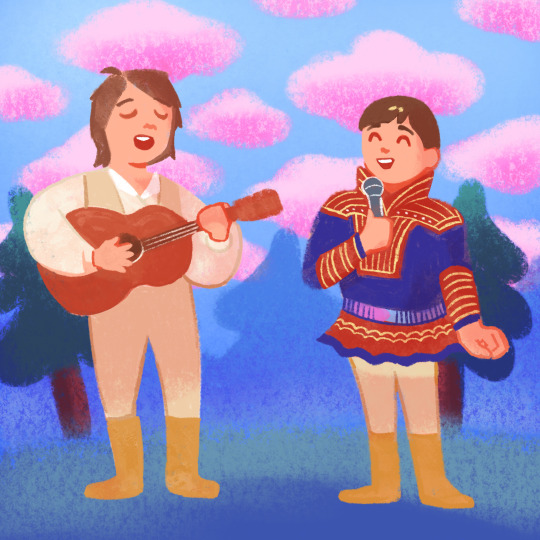
🇳🇴 Sverre Kjellsberg & Mattis Hætta - Sámiid Ædnan
#Sverre Kjellsberg & Mattis Hætta#Sámiid Ædnan#norway esc#esc norway#norway eurovision#eurovision norway#esc 1980#eurovision 1980#esc#eurovision#Lapland#this was a really cool protest song
32 notes
·
View notes
Text
ABBA - Waterloo
1974
"Waterloo" is a song by Swedish pop group ABBA, with music composed by Benny Andersson and Björn Ulvaeus and lyrics written by Stikkan Anderson. It is first single of the group's second studio album of the same name, and their first under the Atlantic label in the US. This was also the first single to be credited to the group performing under the name ABBA. The title and lyrics reference the 1815 Battle of Waterloo, and use it as a metaphor for a romantic relationship.
In 1974, "Waterloo" represented Sweden in the 19th edition of the Eurovision Song Contest held in Brighton, winning the contest and beginning ABBA's path to worldwide fame. The song differed from the standard "dramatic ballad" tradition at the contest by its flavour and rhythm, as well as by its performance. ABBA gave the audience something that had rarely been seen before in Eurovision: flashy costumes (including silver platform boots), a catchy uptempo song and simple choreography. It was the first winning entry in a language other than that of their home country; prior to 1973, all Eurovision singers had been required to sing in their country's native tongue, a restriction that was lifted briefly for the contests between 1973 and 1976 (thus allowing "Waterloo" to be sung in English), then reinstated before ultimately being removed again in 1999. Watch the performance in Swedish here. Sveriges Radio released a promo video for "Waterloo" that was directed by film director Lasse Hallström, whose first notable English-language film success was What's Eating Gilbert Grape in 1993. ABBA recorded the German and French versions of "Waterloo" in March and April 1974; the French version was adapted by Alain Boublil, who would later go on to co-write the 1980 musical Les Misérables.
The song shot to number 1 in the UK and stayed there for two weeks, becoming the first of the band's nine UK number 1's, and the 16th biggest selling single of the year in the UK. It also topped the charts in Belgium, Denmark, Finland, West Germany, Ireland, Norway, and Switzerland, while reaching the Top 3 in Austria, France, the Netherlands, Spain, and Sweden. Unlike other Eurovision-winning tunes, the song's appeal transcended Europe: "Waterloo" also topped the charts in South Africa, and reached the Top 10 in Australia, Canada, New Zealand, Rhodesia, and the US (peaking at number 6, their third-highest-charting US hit after number 1 "Dancing Queen" and number 3 "Take a Chance on Me"). In 2005, at Eurovision fiftieth anniversary competition Congratulations: 50 Years of the Eurovision Song Contest, "Waterloo" was chosen as the best song in the contest's history.
"Waterloo" is featured in the encore of the musical Mamma Mia!. The song does not have a context or a meaning. It is just performed as a musical number in which members of the audience are encouraged to get up off their seats and sing, dance and clap along. The song is performed by the cast over the closing credits of the film Mamma Mia!, but is not featured on the official soundtrack. It is also performed as part of the story in the sequel, Mamma Mia! Here We Go Again, by Hugh Skinner and Lily James.
The Australian film Muriel's Wedding (1994), features "Waterloo" in a pivotal scene in which lead Toni Collette bonds with the character played by Rachel Griffiths. The film's soundtrack, featuring five ABBA tracks, is widely regarded as having helped to fuel the revival of popular interest in ABBA's music in the mid-1990s. "Waterloo" features prominently in the 2015 science-fiction film The Martian. The song plays as the film's lead, played by Matt Damon, works to ready his launch vehicle for a last-chance escape from Mars. In "Mother Simpson", the eighth episode of the seventh season of The Simpsons, Mr. Burns plays "Ride of the Valkyries" from a tank about to storm the Simpson home, but the song is cut-off and "Waterloo" is played, to which Smithers apologizes, advising he "must have accidentally taped over that".
"Waterloo" received a total of 89% yes votes!
youtube
(the video is posted by ABBA's own account, not Eurovision's = safe to watch)
941 notes
·
View notes
Text
youtube
Runner-up Talk: Sally Ann Triplett (Eurovision 1980 & 1982)
#eurovision#eurovision 1980#eurovision 1982#sally ann triplett#esc#uk#uk '80#uk '82#bardo#prima donna#I do not care for ''love enough for two'' AT ALL but ''one step further'' is an absolute banger#maybe not sally ann's best live performance though#op#80s#other
0 notes
Text
youtube
La dolce vita - Finland 1989 - Eurovision songs with live orchestra
0 notes